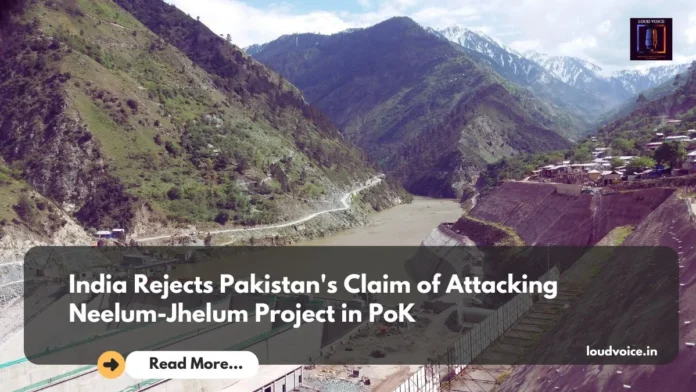Key Takeaways:
- India rejects Pakistan’s claim of attacking Neelum-Jhelum project in PoK as “an absolute and complete fabrication,” according to Foreign Secretary Vikram Misri.
- New Delhi warned Pakistan against using false claims as a pretext to strike Indian infrastructure.
- No contact has occurred between Indian and Pakistani NSAs since Operation Sindoor, contradicting foreign media reports.
- India has suspended the Indus Waters Treaty (IWT) in response to the Pahalgam terror attack and accuses Pakistan of long-standing violations.
- Indian officials emphasize the treaty is outdated and requires revision due to evolving technology and climate realities.
India Rejects Pakistan’s Claim of Attacking Neelum-Jhelum Project in PoK as Fabricated: Vikram Misri
Foreign Secretary Vikram Misri has firmly dismissed Pakistan’s accusation that India targeted the Neelum-Jhelum hydroelectric project in Pakistan-occupied Kashmir (PoK), calling the claim “completely baseless and fabricated.” Speaking at a special press briefing on May 8, 2025, Misri criticized the allegation as a deliberate falsehood designed to justify potential retaliation against Indian infrastructure.
“This is an outright lie and a total fabrication,” Misri stated, warning that if Pakistan uses such misinformation as a pretext to strike Indian assets, it would bear full responsibility for the consequences.
The strong rebuttal comes amid rising tensions along the Line of Control, with India reiterating its commitment to transparency while holding Pakistan accountable for spreading disinformation.
Why the Neelum-Jhelum Claim Matters
The Neelum-Jhelum hydropower plant is a crucial project for Pakistan’s energy sector, constructed in a contentious region claimed by both countries. Alleging that India targeted this facility, especially amid tensions, could serve several purposes for Pakistan:
- Rally domestic political support.
- Justify potential retaliatory actions.
- Gain diplomatic leverage by portraying India as the aggressor.
However, Indian authorities have flatly denied any operations targeting civilian or energy infrastructure across the border. “We do not consider such targets,” an Indian defense official said. “This is a narrative crafted to deflect global attention.”
False Claims Amid a Treaty Crisis
The backdrop to this escalation is India’s recent decision to suspend the Indus Waters Treaty (IWT) following a deadly terror attack in Pahalgam on April 22, 2025, which New Delhi attributed to Pakistan-based actors.
The treaty, a water-sharing agreement signed in 1960 and brokered by the World Bank, had withstood wars and diplomatic breakdowns. But Indian officials argue the treaty is no longer fit for modern realities. “Technological, climatic, and demographic changes must inform how we approach transboundary water management today,” said Misri.
Pakistan’s Allegation and NSA Disinformation
Further muddying the waters, media reports—particularly from Pakistani and Turkish outlets—claimed that the National Security Advisers (NSAs) of India and Pakistan were in contact after Operation Sindoor, a recent Indian counter-terror operation.
Misri shut down those rumors categorically: “There has been no contact at the NSA level since Operation Sindoor.” This adds to India’s concern that Pakistan is using false narratives to stage-manage its diplomatic and strategic image.
India’s Case for Treaty Reform
India contends that the Indus Waters Treaty is based on outdated engineering assumptions from the 1950s. According to Misri, India has sent multiple formal notices to Pakistan over the past two years, calling for a revision to the treaty.
“Even during adversarial times, including wars, India has adhered to the treaty’s terms,” he said. “Pakistan, however, has repeatedly violated its provisions and impeded India’s legitimate rights.”
Disinformation as Diplomatic Provocation
Security analysts view the fabricated Neelum-Jhelum accusation as part of a broader psychological and media warfare strategy. “If you control the narrative, you influence global perception—even if the facts don’t align,” said retired Indian diplomat Rajiv Dogra in an interview with The Hindu.
Such tactics aim to paint India as a belligerent actor while giving Pakistan strategic cover for its own cross-border provocations or retaliatory plans.
Regional Fallout: What’s at Stake?
Analysts suggest that New Delhi’s suspension of the IWT could lead to permanent structural changes in South Asia’s hydro-political landscape, especially if talks for treaty modernization fail.
Conclusion
India’s categorical dismissal of Pakistan’s Neelum-Jhelum accusation reinforces a broader shift in the region’s power dynamics—where truth, treaties, and territorial claims are increasingly entangled in the web of geopolitical storytelling. Foreign Secretary Misri’s forceful rebuttal serves not only as a defense against false narratives but also as a warning: strategic misinformation will not go unanswered. As South Asia grapples with outdated frameworks and escalating tensions, transparency, and assertiveness may define India’s new diplomatic doctrine.


